人教版必修二Unit 3 THE INTERNET-Reading for Writing
- 格式:docx
- 大小:20.21 KB
- 文档页数:3

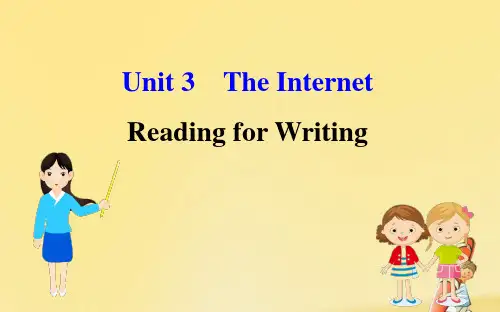
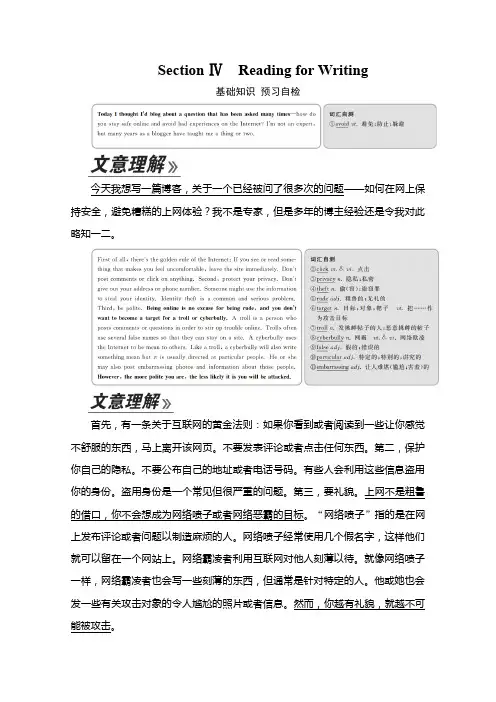
Section ⅣReading for Writing基础知识预习自检今天我想写一篇博客,关于一个已经被问了很多次的问题——如何在网上保持安全,避免糟糕的上网体验?我不是专家,但是多年的博主经验还是令我对此略知一二。
首先,有一条关于互联网的黄金法则:如果你看到或者阅读到一些让你感觉不舒服的东西,马上离开该网页。
不要发表评论或者点击任何东西。
第二,保护你自己的隐私。
不要公布自己的地址或者电话号码。
有些人会利用这些信息盗用你的身份。
盗用身份是一个常见但很严重的问题。
第三,要礼貌。
上网不是粗鲁的借口,你不会想成为网络喷子或者网络恶霸的目标。
“网络喷子”指的是在网上发布评论或者问题以制造麻烦的人。
网络喷子经常使用几个假名字,这样他们就可以留在一个网站上。
网络霸凌者利用互联网对他人刻薄以待。
就像网络喷子一样,网络霸凌者也会写一些刻薄的东西,但通常是针对特定的人。
他或她也会发一些有关攻击对象的令人尴尬的照片或者信息。
然而,你越有礼貌,就越不可能被攻击。
你曾经有过任何不好的上网经历?或者你有可以保持上网安全的一些好建议吗?在下面发表你的看法!Boy579:去年,我们在自己的聊天室遭遇了一些问题。
我们完全不认识的人发出了很刻薄的言论。
我觉得,他或她只是想制造麻烦。
Amy :我们学校的一个女孩在网上有一个很不好的经历。
她的一张照片被发到了网上,并且她变成了大家取笑的对象。
一开始看起来是一个玩笑,但是却让那个女孩感觉很苦恼。
重点知识 合作探究She's very particular_about her clothes.她对衣着特别挑剔。
②Why should he notice her car in_particular?他为什么会特别注意到她的车?③(2019·全国卷Ⅱ)Then he found that the animals around were very beautiful, and he particularly enjoyed observing the birds he saw.然后他发现周围的动物非常漂亮,他特别喜欢观察他看到的鸟。
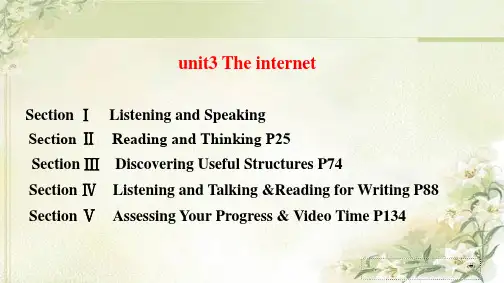
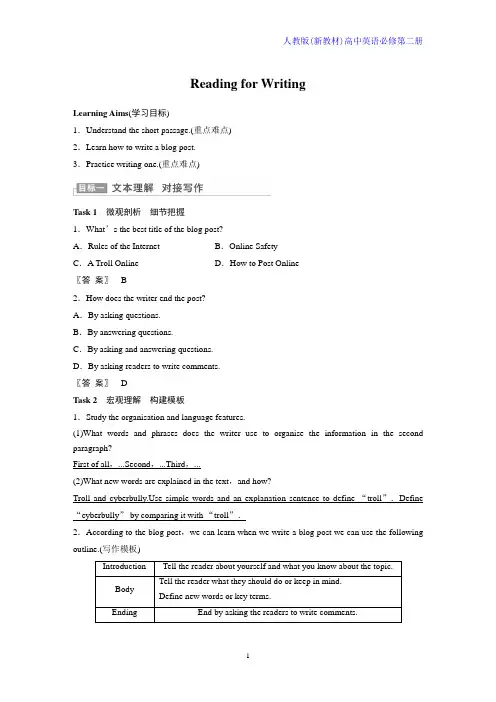
Reading for WritingLearning Aims(学习目标)1.Understand the short passage.(重点难点)2.Learn how to write a blog post.3.Practice writing one.(重点难点)Task 1微观剖析细节把握1.What’s the best title of the blog post?A.Rules of the Internet B.Online SafetyC.A Troll Online D.How to Post Online〖答案〗 B2.How does the writer end the post?A.By asking questions.B.By answering questions.C.By asking and answering questions.D.By asking readers to write comments.〖答案〗 DTask 2宏观理解构建模板1.Study the organisation and language features.(1)What words and phrases does the writer use to organise the information in the second paragraph?First of all,...Second,...Third,...(2)What new words are explained in the text,and how?Troll and e simple words and an explanation sentence to define “troll”.Define “cyberbully” by comparing it with “troll”.2.According to the blog post,we can learn when we write a blog post we can use the following outline.(写作模板)Introduction Tell the reader about yourself and what you know about the topic.Body Tell the reader what they should do or keep in mind. Define new words or key terms.Ending End by asking the readers to write comments.本单元的写作任务要求写一篇“博客”。

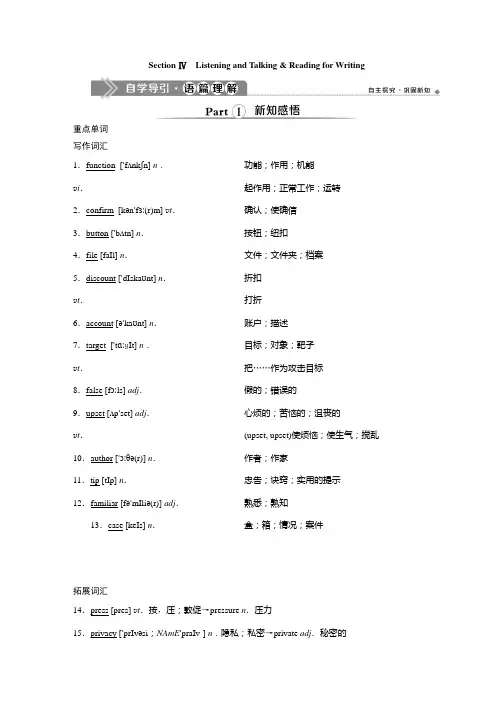
Section ⅣListening and Talking & Reading for Writing重点单词写作词汇1.function_['fʌnkʃn] n.功能;作用;机能v i.起作用;正常工作;运转2.confirm_[kən'fɜː(r)m] v t.确认;使确信3.button ['bʌtn] n.按钮;纽扣4.file [faIl] n.文件;文件夹;档案5.discount ['dIskaʊnt] n.折扣v t.打折6.account [ə'kaʊnt] n.账户;描述7.target_['tɑːɡIt] n.目标;对象;靶子v t.把……作为攻击目标8.false [fɔːls] adj.假的;错误的9.upset [ʌp'set] adj.心烦的;苦恼的;沮丧的v t.(upset, upset)使烦恼;使生气;搅乱10.author ['ɔːθə(r)] n.作者;作家11.tip [tIp] n.忠告;诀窍;实用的提示12.familiar [fə'mIliə(r)] adj.熟悉;熟知13.case [keIs] n.盒;箱;情况;案件拓展词汇14.press [pres] v t.按,压;敦促→pressure n.压力15.privacy ['prIvəsi;NAmE'praIv-] n.隐私;私密→private adj.秘密的16.rude [ruːd] adj.粗鲁的;无礼的→rudeness n.无礼,粗鲁17.particular [pə'tIkjələ(r)] adj.特定的;特别的;讲究的→particularly ad v.特别地18.embarrassing [Im'bærəsIŋ] adj.让人难堪(尴尬;害羞)的→embarrass v t.使局促不安→embarrassed adj.尴尬的;陷入困境的阅读词汇19.battery ['bætri] n.电池20.click [klIk] v t.& v i.点击21.theft [θeft] n.偷(窃);盗窃罪22.troll [trɒl;trəʊl] n.发挑衅帖子的人;恶意挑衅的帖子23.cyberbully ['saIbəbʊli] n.网霸v t.& v i.网络欺凌24.guideline ['ɡaIdlaIn] n.准则;指导原则25.define [dI'faIn] v t.给……下定义;界定;解释26.the World Wide Web 万维网;环球信息网重点短语1.in_shape状况良好2.keep_track_of 掌握……的最新消息;了解……的动态3.give_out 发出,公布4.make_trouble 制造麻烦5.make_fun_of取笑;戏弄6.be_familiar_with 对……熟悉7.keep(...)_in_mind 牢记8.build_up 建立重点句型1.keep sb. done使某人被……:This app keeps_you_updated_on_all_your_favourite_topics(让你更新所有你喜欢的话题).2.the+比较级,the+比较级:However, the_more_polite_you_are(你越有礼貌), the less likely it is you will be attacked.Read the text on Page 32 and then choose the best answer.1.What’s the main idea of the blog post?A.A bad experience on the Internet.B.Some advice on how to make comments on the Internet.C.Some tips on how to become a good blogger.D.Some tips on how to surf the Internet safely.2.Who are the online troublemakers the blog post mentions?A.A person who often uses false name.B.A person who posts comments or questions so as to make trouble online.C.A person who often uses the Internet to be rude to others.D.All of them.3.What does the writer tell the reader in Paragraph 1?A.Definition of online safety.B.The writer’s knowledge of the Internet.C.How to avoid the bad experiences on the Internet.D.The topic of the post.答案:1-3.DDDconfirm v t.确认;使确信(经典佳句)My teacher’s encouragement confirms me in the belief that I will surely win the championship of Chinese Poetry Competition.老师的鼓励使我坚信,我一定能获得中国诗歌比赛的冠军。
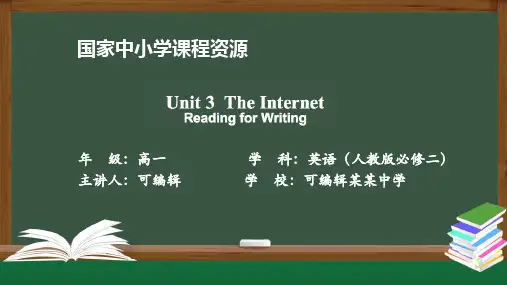
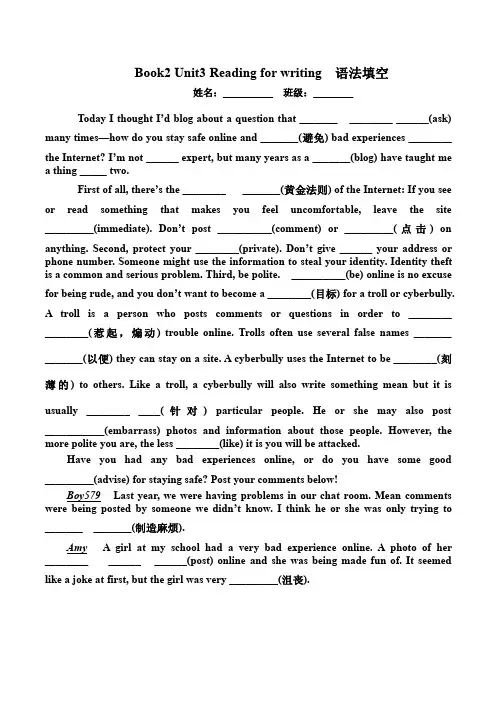
Book2Unit3Reading for writing语法填空姓名:__________班级:________Today I thought I’d blog about a question that_____________________(ask) many times—how do you stay safe online and_______(避免)bad experiences________ the Internet?I’m not______expert,but many years as a_______(blog)have taught mea thing_____two.First of all,there’s the_______________(黄金法则)of the Internet:If you see or read something that makes you feel uncomfortable,leave the site _________(immediate).Don’t post__________(comment)or_________(点击)on anything.Second,protect your________(private).Don’t give______your address or phone number.Someone might use the information to steal your identity.Identity theft is a common and serious problem.Third,be polite.__________(be)online is no excuse for being rude,and you don’t want to become a________(目标)for a troll or cyberbully.A troll is a person who posts comments or questions in order to________ ________(惹起,煽动)trouble online.Trolls often use several false names_______ _______(以便)they can stay on a site.A cyberbully uses the Internet to be________(刻薄的)to others.Like a troll,a cyberbully will also write something mean but it is usually____________(针对)particular people.He or she may also post ___________(embarrass)photos and information about those people.However,the more polite you are,the less________(like)it is you will be attacked.Have you had any bad experiences online,or do you have some good _________(advise)for staying safe?Post your comments below!Boy579Last year,we were having problems in our chat room.Mean comments were being posted by someone we didn’t know.I think he or she was only trying to ______________(制造麻烦).Amy A girl at my school had a very bad experience online.A photo of her ____________________(post)online and she was being made fun of.It seemed like a joke at first,but the girl was very_________(沮丧).。

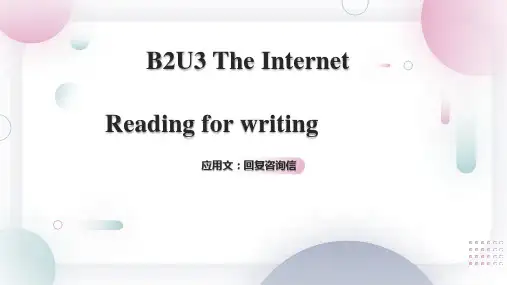
Unit 3 The Internet——Reading for Writing一、语法填空1. Nowadays, _____(surf) the Internet is very common and popular.2. The purpose of this activity is _____(show) our rich campus culture and the students ’ various talents.3. Only when we identify the interests of people_____our own happiness can we be remembered as true stars.4. The _____(inspire) riding trip launched by Youth Riding Association is coming.5. Only in this way can we enjoy the pleasure and _______(convenient) of the shared bikes.二、阅读理解The sun is going to expand into the orbit of Mercury according to scientific calculations, which will result in the entire Earth catching on fire. Who will save the world?This imaginative tale is at the heart of the latest Chinese sci-fi movie The Wandering Earth. Unlike many American space-themed films where the solution to a disaster Earth faces is always fleeing (逃离) the planet in spaceships, this time we’re taking the Earth with us. The film, which has made it the country’s most successful film of all time, has offered a different and more ambitious idea.The “ambition” didn’t come from nowhere. For thousandsof years, “homeland” has had a soft spot in the hearts and minds of Chinese people. One old idiom that shows a strong feeling that Chinese people have had for their homeland is “luo ye gui gen”, which means returning to one’s homeland in old age, like fallen leaves returning to the roots of their tree.“What is Chinese sci-fi?” Guo Fan, the film’s director, said in an interview. “A vehicle that really expresses our cultural and spiritual core (核心 ) can be called Chinese sci-fi. Otherwise, we’re just following others and telling the same Hollywood stories. ”And the makers of The Wandering Earth may have chosen the best time to tell its Chinese sci-fi story. The film was released on Feb 5, the first day of Chinese New Year. It was a time when many people had just made the hard journey back to their hometowns. So to them, there is only one possible way to tell the story: Earth goes wherever humans go, because it’s our home.1. The main purpose of the opening paragraph is to_______.A. give a brief account of the filmB. warn people of the coming threatC. explore ways to avoid the disasterD. introduce the topic of the passage2. The underlined phrase “a different and more ambitious idea”refers to_______.A. fleeing the Earth in spaceshipsB. bringing in huge successC. filling the gap in Chinese sci-fi moviesD. helping Earth make its escape3. Which of the following is unlikely to account for the success of the film?A. The rich imagination of the story.B. Hollywood-style space stories.C. The special cultural background.D. The time chosen to release the film.4. What is likely to be title for the passage?A. Chinese Sci-fi Catches UpB. The Most Successful Chinese Sci-fiC. Chinese Sci-fi Sets a New PathD. Chinese Sci-fi Challenges Hollywood三、语法填空阅读下面短文, 在空白处填入1个适当的单词或括号内单词的正确形式。
Unit 3 The Internet单元分析本单元主题:人与社会、人与自我一、单元内容分析本单元主题是人与社会,围绕互联网这一话题展开讨论。
二十一世纪是信息时代,互联网给我们的生活、工作和学习带来了巨大的变化。
与此同时,网络信息安全、网络霸凌、网络诈骗等侵害网民人身和财产安全的问题也暴露出来。
这提醒人们在尽享网络便利的同时,也要增强防护意识,保护个人隐私和上网安全。
学习本单元,引导学生了解互联网给我们的生活带来的积极和消极的影响。
在了解的基础上,能够结合自己的生活,学会安全上网。
以下为教材各部分教学内容简要分析及教学活动实施建议:1.Opening Page 主题图用深蓝色代表深邃浩渺的宇宙和我们居住的地球;纵横交织、四通八达的线条代表网络连接,把散布在地球各个角落的人紧密联系在一起,充分展示了互联网的本质-互联互通。
开篇页的引言“The Internet is becoming the town square for the global village of tomorrow.”来自比尔·盖茨,可译为:因特网正成为明日地球村的中心广场。
该名言用“中心广场”隐喻“互联网”,生动传神。
2.Listening and Speaking:Ask about online habits该板块的听力文本是调查类访谈,调查者通过同样的问题采访特定人群来获取信息,从而了解他们对该问题的看法或者态度。
本板块的主题是“上网习惯调查”,让学生去调查同伴的网络使用情况,有利于他们增进相互了解,提升对互联网的认识,同时可以帮助他们反思自己的上网行为,借鉴他人良好的上网习惯,戒除自己不良的上网行为。
通过一系列的听力活动,指导学生掌握听取生词定义的策略,培养学生对听力文本中关键信息的获取、整理和归纳的能力。
同时,要求学生关注听力文本中的交际用语表达,为口语输出这一环节做准备。
3.Reading and Thinking:Starting an online community 主课文以“创办网上社区”为主题,讲述了英国一位年过五旬的失业女教师利用互联网改变了自己也帮助了他人的故事。
Reading for Writing & Other Parts of the Unit基础巩固Ⅰ.单词拼写1.Our bus won’t start because the battery(电池) is out of order.2.The function of the heart is to pump blood through the body.3.If you agree,please select “I agree” and then click“Next”.4.The village lies beside a main road,making it an easy target(目标,对象) for theft.5.I bought a pair of sneakers at a 30% discount,which was cheaper than expected.6.This week’s magazine has some tips(忠告,建议) on how to stir up the children’s interest in reading.Ⅱ.单句语法填空7.He stood up suddenly,upsetting(upset) a glass of wine.8.Compared with others,he is in good shape for a man of his age.9.Keep track of all the progress you have made by keeping a journal.10.I can’t have you speaking to your mother so rudely(rude) like this.11.It’s said that the traffic is bad in that city,particularly(particular) in the center.12.To our disappointment,she enjoys playing WeChat rather than studying(study).13.You ought not to make fun of the man,who is not the one you laugh at but learn from. 14.I couldn’t remember his name while talking with him,which made me very embarrassed(embarrass).Ⅲ.单句写作15.已经确定我们下周一要开会。
Unit 3 The Internet
Reading for Writing
【学习目标】
1. To acquire some features about a blog post by reading the text.
2. To write a summary about a blog post properly using some newly acquired writing skills in this period.
3. To absorb some language points concerning the topic.
【学习重难点】
1. To study the organization and language features of a blog post.
2. To use what has been learned to write a blog post about online safety.
3. To exchange drafts with a partner. Use the checklist to help your partner revise his/her draft.
【学习过程】
Step 1: Skimming
1. What’s the main purpose of the blog post?
2. What’s Paragraph 2 mainly about?
Step 2: Scanning
1. What tips did the blogger put forward?
2. Who are the online troublemakers the blog post mentions?
3. What does the following terms mean?
• A troll
• A cyberbully
Step 3 Study the organization and language features.
Read the blog again and find these parts.
1. What is the topic of the blog?
A 1. ___________—how do you 2. ___________ safe online and avoid bad 3. ___________ on the Internet?
2. What are the specific advice to stay safe online?
First, follow the 4. ___________ rule: leave the site 5. ___________ when you see or read something 6. ___________.
Second, protect your 7. ___________.
Third, be 8. ___________.
3.鼓励网友留言。
Any bad experiences online? Or some good 9. ___________? Post your 10. ___________ please!
Step 4 Use what you have learnt to write a blog post.
【写作指导】
【文体剖析】
网络博客文体是包含了网友评论、相关新闻链接在内的一种新兴的新闻文体。
它通常就某一问题发表自己的观点, 体现了个性化的交流。
文章通常以陈述句居多, 也较多地采用疑问句和感叹句, 用来表达强烈的情感。
【话题词汇】
blog about a question 就某一问题写博客
stay safe online在网上保持安全
bad experiences on the Internet好的上网经历
golden rule黄金法则
post comments帖子评论
click on点击
identity theft身份盗窃
chat room聊天室
draft your blog post起草博客帖子
post embarrassing photos张贴尴尬照片
【话题句式】
1. How do you stay safe online and _______________ on the Internet?
你如何在网上保持安全, 避免在网上的不良经历?
2. I’m not _______________, but many years as a blogger have taught me a thing or two.
我不是专家, 但作为一个博主, 我已经学了好几年了。
3. If you see or read something that makes you _______________, leave the site immediately.
如果你看到或读到一些让你觉得不舒服的东西, 立即离开这个网站。
4. Don’t _______________ your address or phone number.
别告诉别人你的地址或电话号码。
5. _______________ is a common and serious problem.
身份盗窃是一个常见而严重的问题。
6. _______________ is no excuse for being rude, and you don’t want to _______________ for a troll or cyberbully. 上网并不是无礼的借口, 你也不想成为发挑衅帖子的人或网络恶霸的目标。
7. Trolls often use several false names _______________ they can stay on a site.
发挑衅帖子的人经常使用几个假名, 这样他们就可以留在一个网站上。
8. However, ______________ you are, the less likely it is you _______________.
然而, 你越有礼貌, 你被攻击的可能性就越小。
Step 5 Homework:
假设你是李华, 请用英文发帖, 内容应包括:
1. 赞同Susan的看法;
2. 你收到或送出的最好礼物是什么;
3. 该礼物的意义;
4. 期待大家的回复。
注意: 1. 词数100左右; 2. 符合语言规范。
_____________________________________________________________________ _____________________________________________________________________ _____________________________________________________________________ _____________________________________________________________________ ____________________________________________________________________。